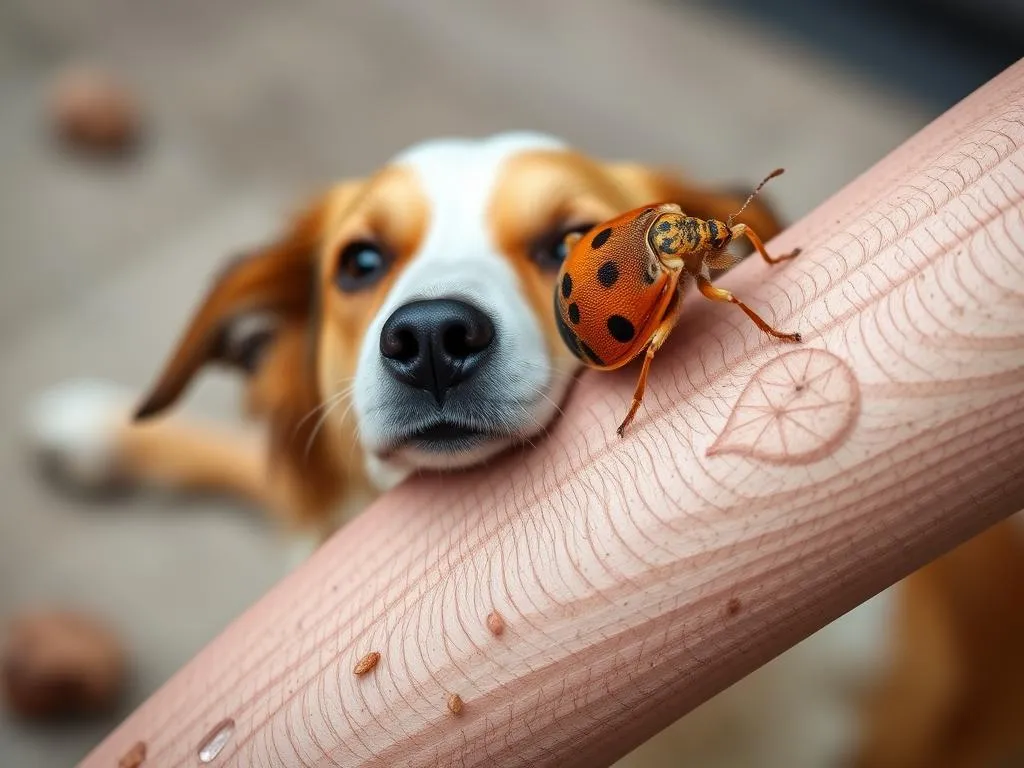
Introduction
Stink bugs, with their distinctive shield shape and pungent odor, are a common sight in many homes, especially during warmer months. For pet owners, a typical concern arises when their curious canine companions decide to sample these unusual pests. If you’ve found yourself asking, “my dog ate a stink bug vet answer,” you’re not alone. Understanding your pet’s behavior in relation to household pests is essential for their health and well-being.
Understanding Stink Bugs
What Are Stink Bugs?
Stink bugs belong to the family Pentatomidae and are known for their ability to release a foul odor when threatened. These insects are typically brown or green and have a distinctive shield-like shape. The most common species found in households include the brown marmorated stink bug and the green stink bug. They often invade homes in search of warmth during the fall and winter months.
Why Do Dogs Eat Stink Bugs?
Dogs are naturally curious creatures, and their playful nature often leads them to investigate and nibble on various objects, including stink bugs. There are a couple of reasons why your dog might find these insects appealing:
-
Curiosity and Playfulness: Dogs explore the world with their mouths. A moving stink bug can easily capture their attention as it scuttles across the floor.
-
Taste and Smell Attraction: Some dogs may be attracted by the unique odor of stink bugs, which can vary from mildly sweet to incredibly pungent. The scent can sometimes entice dogs to give these bugs a taste.
Are Stink Bugs Harmful to Dogs?
While stink bugs are not toxic in the same way that some other insects can be, they can still pose risks to your pet’s health. The main concerns include:
-
Potential Toxicity: Stink bugs contain chemical compounds that can be harmful if ingested in large amounts. While most dogs may not experience serious issues, some could have adverse reactions.
-
Symptoms to Watch For: After eating a stink bug, watch for signs such as vomiting, diarrhea, or any unusual behavior. If these symptoms occur, it may indicate that your dog is having a negative reaction.
Immediate Steps to Take if Your Dog Eats a Stink Bug
Assessing the Situation
If you notice that your dog has eaten a stink bug, the first step is to assess the situation:
-
Observing Your Dog’s Behavior: Is your dog acting normally, or is there any sign of distress? Keep an eye on them for any changes in behavior.
-
Identifying Any Immediate Symptoms: Look for any signs of gastrointestinal upset, such as drooling, gagging, or discomfort.
Contacting Your Veterinarian
If your dog shows signs of distress or if you have concerns about the quantity of stink bugs consumed, it’s essential to contact your veterinarian.
-
When to Call the Vet: If your dog exhibits severe symptoms like persistent vomiting, lethargy, or swelling, it’s time to seek professional help.
-
What Information to Provide: When you call, be ready to share details such as your dog’s size, breed, age, and the number of stink bugs eaten. This information can help your vet assess the situation more accurately.
Common Symptoms After Eating a Stink Bug
Gastrointestinal Reactions
One of the most common reactions dogs may have after eating stink bugs involves their digestive system.
-
Vomiting and Diarrhea: These are the most frequently reported symptoms. If your dog vomits or has diarrhea soon after eating a stink bug, monitor them closely.
-
Signs of Discomfort or Pain: Look for signs such as whining, pacing, or attempting to hide. This could indicate that your dog is feeling unwell.
Allergic Reactions
Though rare, some dogs may experience allergic reactions to stink bugs.
-
Swelling or Itching: If your dog starts scratching excessively or shows swelling around the face or paws, it could be a sign of an allergy.
-
Breathing Difficulties: If you notice any signs of difficulty breathing, such as wheezing or shortness of breath, seek immediate veterinary assistance.
Rare but Serious Effects
In some cases, eating stink bugs can lead to more severe health issues.
-
Neurological Symptoms: Although very uncommon, some dogs may experience neurological symptoms, such as seizures or loss of coordination, after consuming stink bugs.
-
When to Seek Emergency Care: If you observe any neurological symptoms or if your dog appears to be in significant distress, don’t hesitate to take them to an emergency vet.
Veterinary Insights
What Vets Say About Stink Bugs and Dogs
Most veterinarians agree that while stink bugs are not typically life-threatening, they can cause discomfort and digestive upset in dogs.
-
General Veterinary Opinions: Vets often emphasize the importance of monitoring pets after they consume non-food items. While many dogs recover without any issues, it’s always better to be cautious.
-
Common Advice Given by Vets: Many vets recommend keeping an eye on your dog’s behavior and seeking veterinary care if symptoms persist or worsen.
Treatment Options
If your dog experiences adverse effects from eating a stink bug, treatment options may vary.
-
Home Remedies vs. Professional Treatment: In mild cases, your veterinarian may suggest monitoring your dog at home, ensuring they stay hydrated. However, if symptoms are severe, professional treatment may be necessary.
-
Medications That May Be Prescribed: Depending on the symptoms, a vet may prescribe medications to alleviate vomiting, manage diarrhea, or address allergic reactions.
Prevention Tips
Keeping Your Home Stink Bug-Free
To reduce the chances of your dog encountering stink bugs, consider implementing some pest control strategies.
-
Effective Pest Control Strategies: Seal cracks in your home’s exterior, use screens on windows, and keep doors closed to minimize entry points for these pests.
-
Natural Repellents: Some essential oils, such as peppermint or eucalyptus, can deter stink bugs. However, ensure that these oils are safe for pets before use.
Training Your Dog
Training can play a significant role in preventing future incidents of your dog eating stink bugs.
-
Discouraging Scavenging Behavior: Teach your dog the “leave it” command to help them understand that they should not eat things they find around the house.
-
Commands and Techniques to Prevent Future Incidents: Consistent training and positive reinforcement can help establish good habits and reduce the likelihood of scavenging.
Conclusion
Understanding the implications of your dog eating a stink bug is crucial for ensuring their health and safety. While these insects may not be toxic, they can cause gastrointestinal distress and other reactions that warrant attention. Always monitor your pet’s behavior and consult with your veterinarian if you have any concerns. Keeping your home pest-free and training your dog to avoid scavenging can significantly reduce the chances of such incidents occurring in the future.
FAQs
Can dogs get sick from eating stink bugs?
Yes, dogs can experience gastrointestinal upset, vomiting, or diarrhea after eating stink bugs. While not typically life-threatening, it’s essential to monitor your pet.
What should I do if my dog has eaten multiple stink bugs?
If your dog has eaten multiple stink bugs, contact your veterinarian. They can provide guidance based on your dog’s size and health.
Are there any long-term effects from eating stink bugs?
Most dogs recover without any long-term effects after consuming stink bugs. However, monitoring for any unusual symptoms is crucial.
When should I take my dog to the vet?
You should take your dog to the vet if they exhibit severe symptoms like persistent vomiting, lethargy, or difficulty breathing after eating a stink bug.









